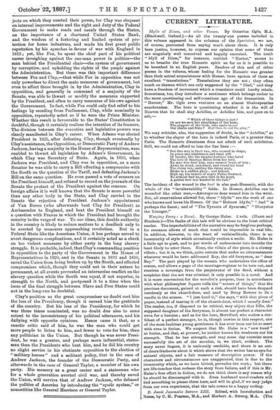CURRENT LITERATURE.
" Which of these things ie lust P Or are we 131¢71 bat playthings of the hour, The leMirtn1 ftget 'Podlir7thtohrtioegclIlle We may criticise, also, the suggestion of doubt, in the "Achilles," as to whether the slayer of the hero is indeed Paris, or a greater than Paris. The Homeric directness does not admit of snob subtleties. Still, we could not afford to lam the fine lines,— "But One was in their van, who seemed in shape,
In grace and nimbleness and fatal gift Of beauty, like the ahophord-primee who lured The love of Spartan Helen from her lord.
No man was near him, none seemed 'ware of him ; Alone he stood, unbulmed, and round his head The rising ono, smiting the rising mist, Broke in a sudden glory ; and behind, High up, the towers of angry Pallas frowned.
No armour bad he, save that in his hand, A golden bow was beaded to the fall."
The incident of the wound in the heel is also post•Homerio, with Mao whole of the " invulnerability " fable. In Homer, Achilles can be wounded like other men,—Asteroprous does wound him in the wrist. But, all reservations allowed for, these " Idylls" are the work of one who knows and loves his Homer. Of the " Hebrew Idylls," " Jael " is perhaps the finest; and of "The Tyrants of Syracuse," " Dionysias the Younger." Idylls of Ilium, and other Verses. By Ootavios Ogle, M.A. (Blackwell, Oxford.)—As all the twenty-one poems included in this volume appeared in the columns of the Spectator, we are, of course, prevented from saying much about them. It is only bare justice, however, to express our opinion that some of them are singularly well conceived and happily executed. The tenth "Idyll of Ilium," for instance, entitled "Hector," seems to us to breathe the true Homeric spirit as far as it is possible to be breathed in an English poem. Readers of this and of other poems in the volume, whose feeling for the Homeric was greater than their actual acquaintance with Homer, have spoken of them as excellent "translations." Translations they are not ; they often touch on themes which are only suggested by the " Iliad," and they have a freedom of movement which a translator could hardly attain. Sometimes, too, they introduce a sentiment which belongs rather to the more questioning and self-conscious age of the dramatists. In " Hector," Mr. Ogle even ventures on an almost Shakespearian anachronism. The hero is questioning whether it is the will of Heaven that he shall slay Achilles, or Achilles him, and goes on to ask,—






































 Previous page
Previous page